Preferences for Honesty in Budgetary Reporting: A Study
VerifiedAdded on 2022/10/06
|6
|1661
|50
AI Summary
This article discusses the preferences for honesty in budgetary reporting and how it affects the slack in the budgets. It also talks about the incorporation of preferences for honesty into the contract design for profit maximization.
Contribute Materials
Your contribution can guide someone’s learning journey. Share your
documents today.

MANAGEMENT ACCOUNTING 1
MANAGEMENT
ACCOUNTING
MANAGEMENT
ACCOUNTING
Secure Best Marks with AI Grader
Need help grading? Try our AI Grader for instant feedback on your assignments.
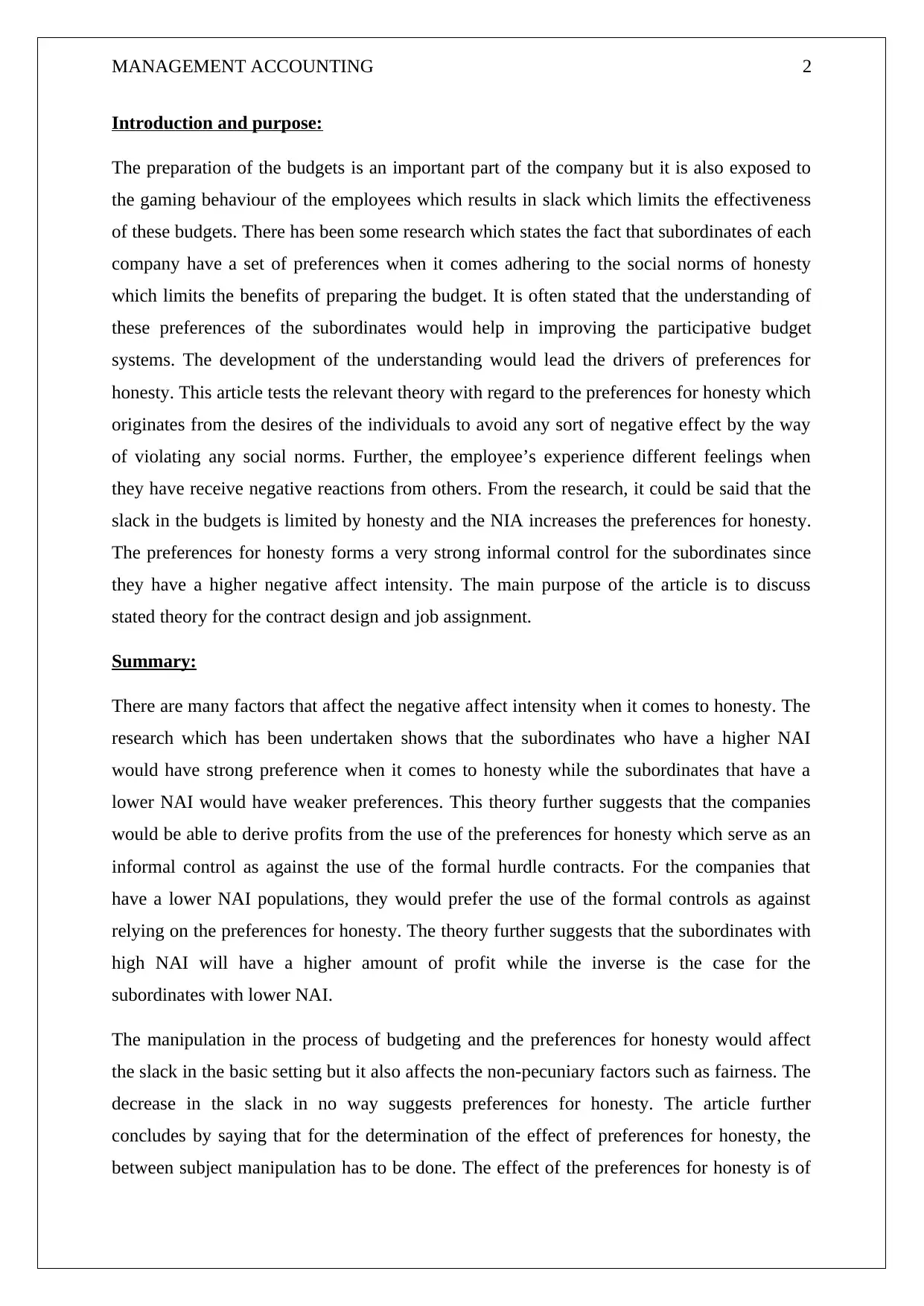
MANAGEMENT ACCOUNTING 2
Introduction and purpose:
The preparation of the budgets is an important part of the company but it is also exposed to
the gaming behaviour of the employees which results in slack which limits the effectiveness
of these budgets. There has been some research which states the fact that subordinates of each
company have a set of preferences when it comes adhering to the social norms of honesty
which limits the benefits of preparing the budget. It is often stated that the understanding of
these preferences of the subordinates would help in improving the participative budget
systems. The development of the understanding would lead the drivers of preferences for
honesty. This article tests the relevant theory with regard to the preferences for honesty which
originates from the desires of the individuals to avoid any sort of negative effect by the way
of violating any social norms. Further, the employee’s experience different feelings when
they have receive negative reactions from others. From the research, it could be said that the
slack in the budgets is limited by honesty and the NIA increases the preferences for honesty.
The preferences for honesty forms a very strong informal control for the subordinates since
they have a higher negative affect intensity. The main purpose of the article is to discuss
stated theory for the contract design and job assignment.
Summary:
There are many factors that affect the negative affect intensity when it comes to honesty. The
research which has been undertaken shows that the subordinates who have a higher NAI
would have strong preference when it comes to honesty while the subordinates that have a
lower NAI would have weaker preferences. This theory further suggests that the companies
would be able to derive profits from the use of the preferences for honesty which serve as an
informal control as against the use of the formal hurdle contracts. For the companies that
have a lower NAI populations, they would prefer the use of the formal controls as against
relying on the preferences for honesty. The theory further suggests that the subordinates with
high NAI will have a higher amount of profit while the inverse is the case for the
subordinates with lower NAI.
The manipulation in the process of budgeting and the preferences for honesty would affect
the slack in the basic setting but it also affects the non-pecuniary factors such as fairness. The
decrease in the slack in no way suggests preferences for honesty. The article further
concludes by saying that for the determination of the effect of preferences for honesty, the
between subject manipulation has to be done. The effect of the preferences for honesty is of
Introduction and purpose:
The preparation of the budgets is an important part of the company but it is also exposed to
the gaming behaviour of the employees which results in slack which limits the effectiveness
of these budgets. There has been some research which states the fact that subordinates of each
company have a set of preferences when it comes adhering to the social norms of honesty
which limits the benefits of preparing the budget. It is often stated that the understanding of
these preferences of the subordinates would help in improving the participative budget
systems. The development of the understanding would lead the drivers of preferences for
honesty. This article tests the relevant theory with regard to the preferences for honesty which
originates from the desires of the individuals to avoid any sort of negative effect by the way
of violating any social norms. Further, the employee’s experience different feelings when
they have receive negative reactions from others. From the research, it could be said that the
slack in the budgets is limited by honesty and the NIA increases the preferences for honesty.
The preferences for honesty forms a very strong informal control for the subordinates since
they have a higher negative affect intensity. The main purpose of the article is to discuss
stated theory for the contract design and job assignment.
Summary:
There are many factors that affect the negative affect intensity when it comes to honesty. The
research which has been undertaken shows that the subordinates who have a higher NAI
would have strong preference when it comes to honesty while the subordinates that have a
lower NAI would have weaker preferences. This theory further suggests that the companies
would be able to derive profits from the use of the preferences for honesty which serve as an
informal control as against the use of the formal hurdle contracts. For the companies that
have a lower NAI populations, they would prefer the use of the formal controls as against
relying on the preferences for honesty. The theory further suggests that the subordinates with
high NAI will have a higher amount of profit while the inverse is the case for the
subordinates with lower NAI.
The manipulation in the process of budgeting and the preferences for honesty would affect
the slack in the basic setting but it also affects the non-pecuniary factors such as fairness. The
decrease in the slack in no way suggests preferences for honesty. The article further
concludes by saying that for the determination of the effect of preferences for honesty, the
between subject manipulation has to be done. The effect of the preferences for honesty is of
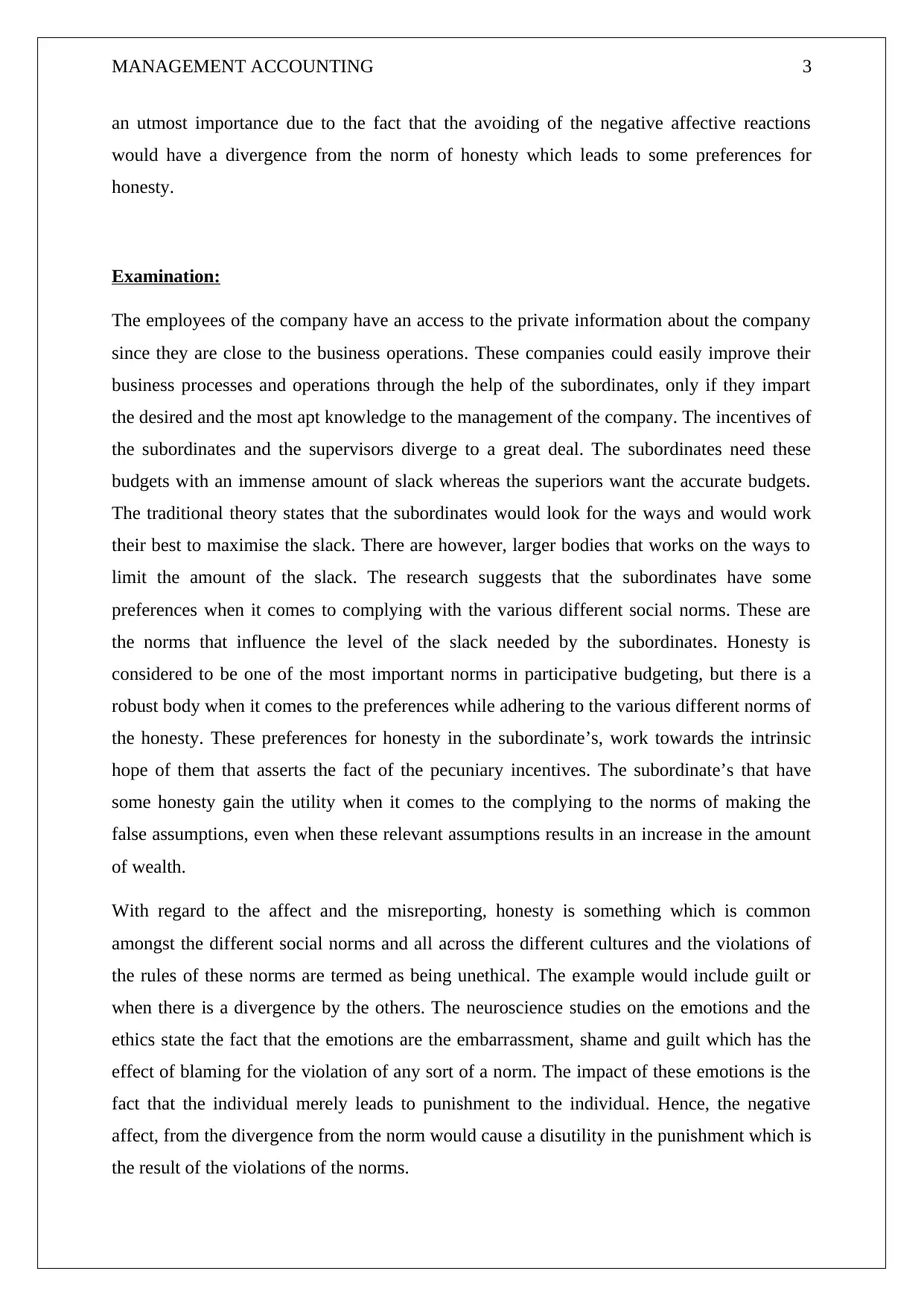
MANAGEMENT ACCOUNTING 3
an utmost importance due to the fact that the avoiding of the negative affective reactions
would have a divergence from the norm of honesty which leads to some preferences for
honesty.
Examination:
The employees of the company have an access to the private information about the company
since they are close to the business operations. These companies could easily improve their
business processes and operations through the help of the subordinates, only if they impart
the desired and the most apt knowledge to the management of the company. The incentives of
the subordinates and the supervisors diverge to a great deal. The subordinates need these
budgets with an immense amount of slack whereas the superiors want the accurate budgets.
The traditional theory states that the subordinates would look for the ways and would work
their best to maximise the slack. There are however, larger bodies that works on the ways to
limit the amount of the slack. The research suggests that the subordinates have some
preferences when it comes to complying with the various different social norms. These are
the norms that influence the level of the slack needed by the subordinates. Honesty is
considered to be one of the most important norms in participative budgeting, but there is a
robust body when it comes to the preferences while adhering to the various different norms of
the honesty. These preferences for honesty in the subordinate’s, work towards the intrinsic
hope of them that asserts the fact of the pecuniary incentives. The subordinate’s that have
some honesty gain the utility when it comes to the complying to the norms of making the
false assumptions, even when these relevant assumptions results in an increase in the amount
of wealth.
With regard to the affect and the misreporting, honesty is something which is common
amongst the different social norms and all across the different cultures and the violations of
the rules of these norms are termed as being unethical. The example would include guilt or
when there is a divergence by the others. The neuroscience studies on the emotions and the
ethics state the fact that the emotions are the embarrassment, shame and guilt which has the
effect of blaming for the violation of any sort of a norm. The impact of these emotions is the
fact that the individual merely leads to punishment to the individual. Hence, the negative
affect, from the divergence from the norm would cause a disutility in the punishment which is
the result of the violations of the norms.
an utmost importance due to the fact that the avoiding of the negative affective reactions
would have a divergence from the norm of honesty which leads to some preferences for
honesty.
Examination:
The employees of the company have an access to the private information about the company
since they are close to the business operations. These companies could easily improve their
business processes and operations through the help of the subordinates, only if they impart
the desired and the most apt knowledge to the management of the company. The incentives of
the subordinates and the supervisors diverge to a great deal. The subordinates need these
budgets with an immense amount of slack whereas the superiors want the accurate budgets.
The traditional theory states that the subordinates would look for the ways and would work
their best to maximise the slack. There are however, larger bodies that works on the ways to
limit the amount of the slack. The research suggests that the subordinates have some
preferences when it comes to complying with the various different social norms. These are
the norms that influence the level of the slack needed by the subordinates. Honesty is
considered to be one of the most important norms in participative budgeting, but there is a
robust body when it comes to the preferences while adhering to the various different norms of
the honesty. These preferences for honesty in the subordinate’s, work towards the intrinsic
hope of them that asserts the fact of the pecuniary incentives. The subordinate’s that have
some honesty gain the utility when it comes to the complying to the norms of making the
false assumptions, even when these relevant assumptions results in an increase in the amount
of wealth.
With regard to the affect and the misreporting, honesty is something which is common
amongst the different social norms and all across the different cultures and the violations of
the rules of these norms are termed as being unethical. The example would include guilt or
when there is a divergence by the others. The neuroscience studies on the emotions and the
ethics state the fact that the emotions are the embarrassment, shame and guilt which has the
effect of blaming for the violation of any sort of a norm. The impact of these emotions is the
fact that the individual merely leads to punishment to the individual. Hence, the negative
affect, from the divergence from the norm would cause a disutility in the punishment which is
the result of the violations of the norms.
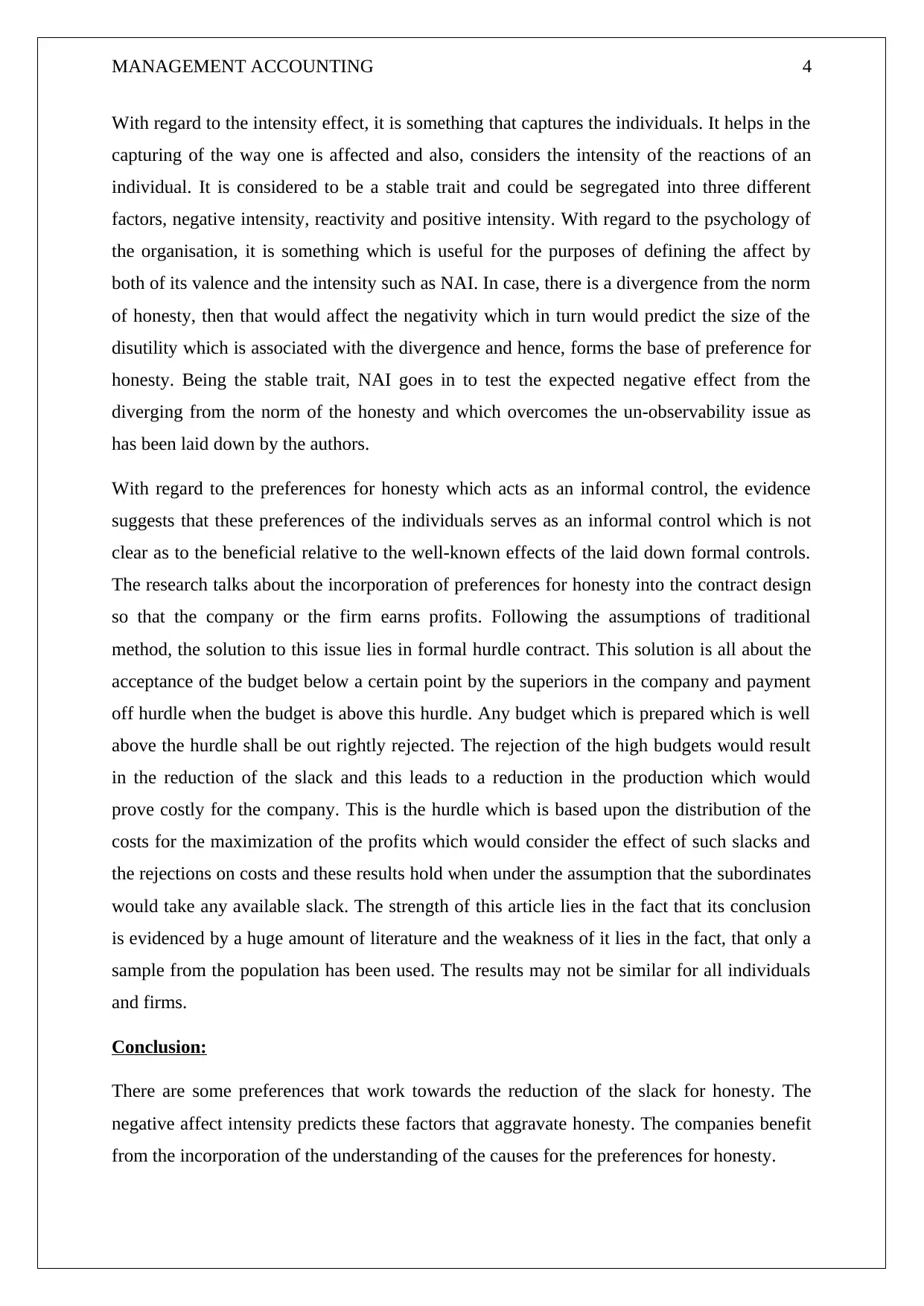
MANAGEMENT ACCOUNTING 4
With regard to the intensity effect, it is something that captures the individuals. It helps in the
capturing of the way one is affected and also, considers the intensity of the reactions of an
individual. It is considered to be a stable trait and could be segregated into three different
factors, negative intensity, reactivity and positive intensity. With regard to the psychology of
the organisation, it is something which is useful for the purposes of defining the affect by
both of its valence and the intensity such as NAI. In case, there is a divergence from the norm
of honesty, then that would affect the negativity which in turn would predict the size of the
disutility which is associated with the divergence and hence, forms the base of preference for
honesty. Being the stable trait, NAI goes in to test the expected negative effect from the
diverging from the norm of the honesty and which overcomes the un-observability issue as
has been laid down by the authors.
With regard to the preferences for honesty which acts as an informal control, the evidence
suggests that these preferences of the individuals serves as an informal control which is not
clear as to the beneficial relative to the well-known effects of the laid down formal controls.
The research talks about the incorporation of preferences for honesty into the contract design
so that the company or the firm earns profits. Following the assumptions of traditional
method, the solution to this issue lies in formal hurdle contract. This solution is all about the
acceptance of the budget below a certain point by the superiors in the company and payment
off hurdle when the budget is above this hurdle. Any budget which is prepared which is well
above the hurdle shall be out rightly rejected. The rejection of the high budgets would result
in the reduction of the slack and this leads to a reduction in the production which would
prove costly for the company. This is the hurdle which is based upon the distribution of the
costs for the maximization of the profits which would consider the effect of such slacks and
the rejections on costs and these results hold when under the assumption that the subordinates
would take any available slack. The strength of this article lies in the fact that its conclusion
is evidenced by a huge amount of literature and the weakness of it lies in the fact, that only a
sample from the population has been used. The results may not be similar for all individuals
and firms.
Conclusion:
There are some preferences that work towards the reduction of the slack for honesty. The
negative affect intensity predicts these factors that aggravate honesty. The companies benefit
from the incorporation of the understanding of the causes for the preferences for honesty.
With regard to the intensity effect, it is something that captures the individuals. It helps in the
capturing of the way one is affected and also, considers the intensity of the reactions of an
individual. It is considered to be a stable trait and could be segregated into three different
factors, negative intensity, reactivity and positive intensity. With regard to the psychology of
the organisation, it is something which is useful for the purposes of defining the affect by
both of its valence and the intensity such as NAI. In case, there is a divergence from the norm
of honesty, then that would affect the negativity which in turn would predict the size of the
disutility which is associated with the divergence and hence, forms the base of preference for
honesty. Being the stable trait, NAI goes in to test the expected negative effect from the
diverging from the norm of the honesty and which overcomes the un-observability issue as
has been laid down by the authors.
With regard to the preferences for honesty which acts as an informal control, the evidence
suggests that these preferences of the individuals serves as an informal control which is not
clear as to the beneficial relative to the well-known effects of the laid down formal controls.
The research talks about the incorporation of preferences for honesty into the contract design
so that the company or the firm earns profits. Following the assumptions of traditional
method, the solution to this issue lies in formal hurdle contract. This solution is all about the
acceptance of the budget below a certain point by the superiors in the company and payment
off hurdle when the budget is above this hurdle. Any budget which is prepared which is well
above the hurdle shall be out rightly rejected. The rejection of the high budgets would result
in the reduction of the slack and this leads to a reduction in the production which would
prove costly for the company. This is the hurdle which is based upon the distribution of the
costs for the maximization of the profits which would consider the effect of such slacks and
the rejections on costs and these results hold when under the assumption that the subordinates
would take any available slack. The strength of this article lies in the fact that its conclusion
is evidenced by a huge amount of literature and the weakness of it lies in the fact, that only a
sample from the population has been used. The results may not be similar for all individuals
and firms.
Conclusion:
There are some preferences that work towards the reduction of the slack for honesty. The
negative affect intensity predicts these factors that aggravate honesty. The companies benefit
from the incorporation of the understanding of the causes for the preferences for honesty.
Secure Best Marks with AI Grader
Need help grading? Try our AI Grader for instant feedback on your assignments.
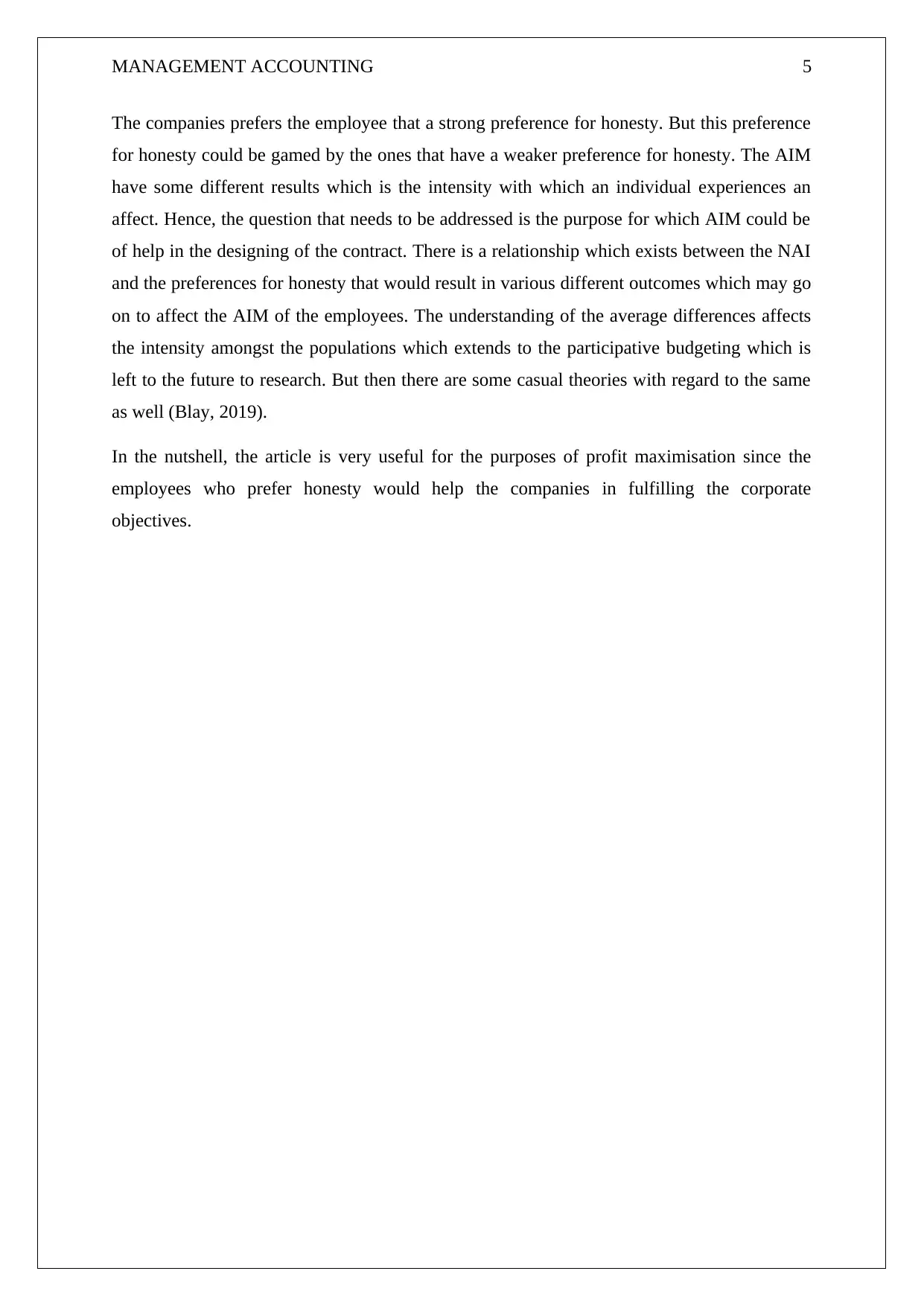
MANAGEMENT ACCOUNTING 5
The companies prefers the employee that a strong preference for honesty. But this preference
for honesty could be gamed by the ones that have a weaker preference for honesty. The AIM
have some different results which is the intensity with which an individual experiences an
affect. Hence, the question that needs to be addressed is the purpose for which AIM could be
of help in the designing of the contract. There is a relationship which exists between the NAI
and the preferences for honesty that would result in various different outcomes which may go
on to affect the AIM of the employees. The understanding of the average differences affects
the intensity amongst the populations which extends to the participative budgeting which is
left to the future to research. But then there are some casual theories with regard to the same
as well (Blay, 2019).
In the nutshell, the article is very useful for the purposes of profit maximisation since the
employees who prefer honesty would help the companies in fulfilling the corporate
objectives.
The companies prefers the employee that a strong preference for honesty. But this preference
for honesty could be gamed by the ones that have a weaker preference for honesty. The AIM
have some different results which is the intensity with which an individual experiences an
affect. Hence, the question that needs to be addressed is the purpose for which AIM could be
of help in the designing of the contract. There is a relationship which exists between the NAI
and the preferences for honesty that would result in various different outcomes which may go
on to affect the AIM of the employees. The understanding of the average differences affects
the intensity amongst the populations which extends to the participative budgeting which is
left to the future to research. But then there are some casual theories with regard to the same
as well (Blay, 2019).
In the nutshell, the article is very useful for the purposes of profit maximisation since the
employees who prefer honesty would help the companies in fulfilling the corporate
objectives.
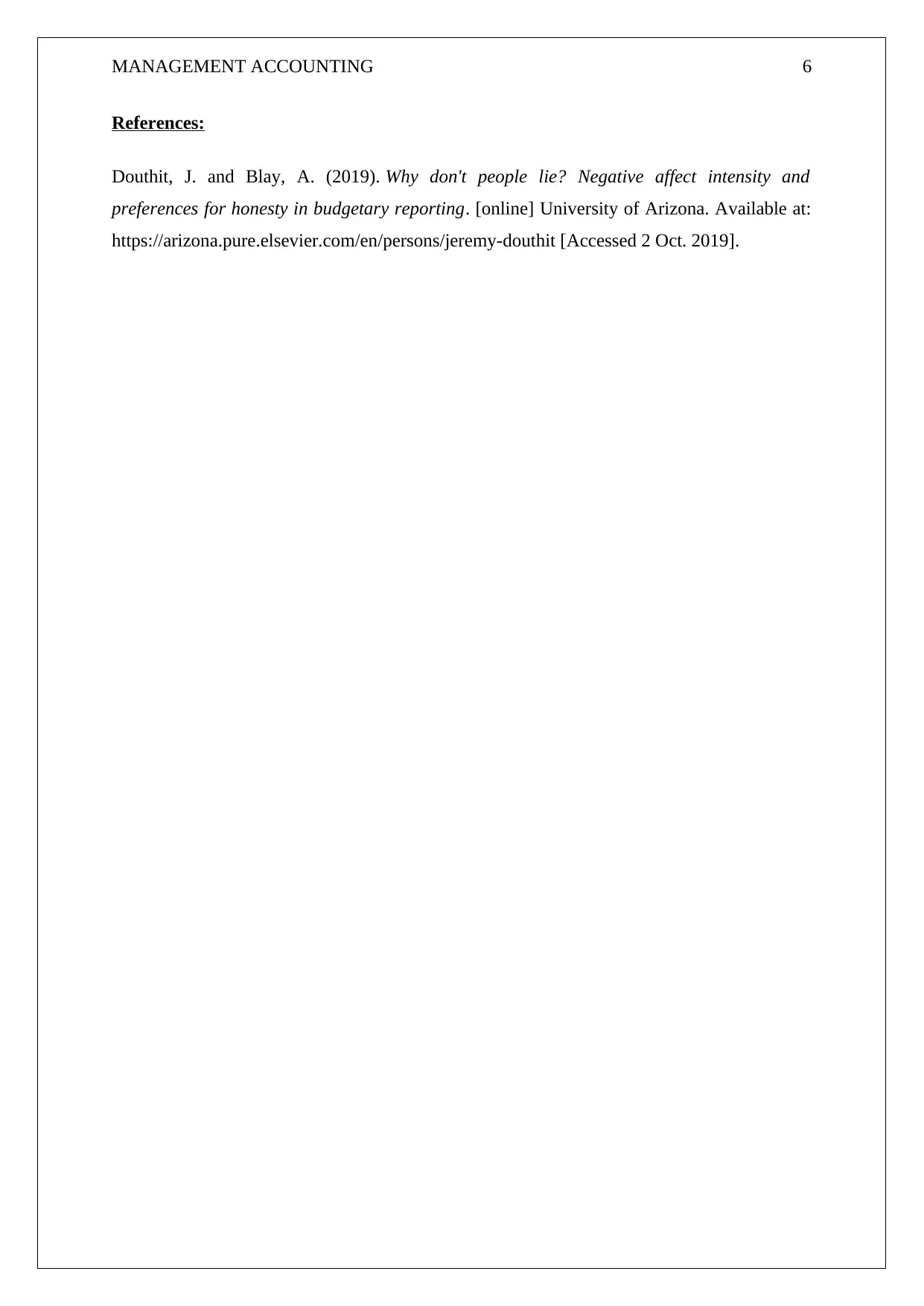
MANAGEMENT ACCOUNTING 6
References:
Douthit, J. and Blay, A. (2019). Why don't people lie? Negative affect intensity and
preferences for honesty in budgetary reporting. [online] University of Arizona. Available at:
https://arizona.pure.elsevier.com/en/persons/jeremy-douthit [Accessed 2 Oct. 2019].
References:
Douthit, J. and Blay, A. (2019). Why don't people lie? Negative affect intensity and
preferences for honesty in budgetary reporting. [online] University of Arizona. Available at:
https://arizona.pure.elsevier.com/en/persons/jeremy-douthit [Accessed 2 Oct. 2019].
1 out of 6
Related Documents
Your All-in-One AI-Powered Toolkit for Academic Success.
+13062052269
info@desklib.com
Available 24*7 on WhatsApp / Email
![[object Object]](/_next/static/media/star-bottom.7253800d.svg)
Unlock your academic potential
© 2024 | Zucol Services PVT LTD | All rights reserved.





